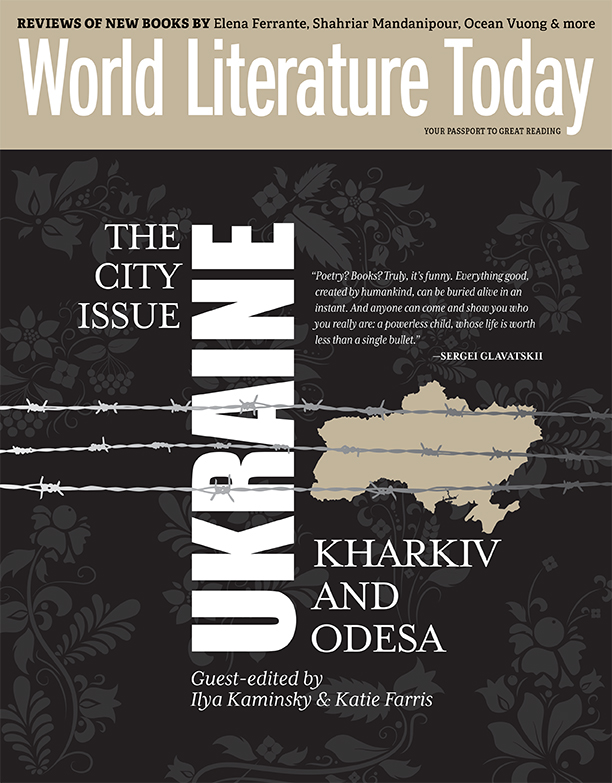Nollywood: A Dark Horse Dreams of Becoming the Black Swan

Named after Hollywood and Bollywood, Nollywood—Nigeria’s motion-picture industry—began on VHS tapes, literally gained altitude as in-flight offerings in the 1990s, and now has films streaming on Netflix and Amazon Prime. Nigerian poet and lawyer Tade Ipadeola traces this rise of the industry, along with its rising scrutiny.
To begin where we are, as the poet Czesław Miłosz exhorts, is a great piece of advice when it comes to Nollywood. Born ostensibly on the wrong side of the tracks and named after more famous cousins, Hollywood in the United States and Bollywood in India, Nollywood stubbornly climbed into some reckoning as a motion-picture industry. When the word “Nollywood” began to gain currency in the early 1990s, it was as some kind of insider joke. At the time, the motion pictures from Nigeria were not big-budget celluloid affairs but VHS home videos. They were produced daily. The quality, for the most part, was so abysmal that purists could not but object to their description as films. The Nollywood “films” nevertheless began to sell, and soon the African diaspora began to patronize them. Nostalgia has its uses. And then, by and by, the world took notice.
When King of Boys, a film by Kemi Adetiba, premiered in 2018, it went on to win a brace of awards at the Africa Movie Academy Awards. It was a modest commercial success and was followed by a sequel, King of Boys 2, in 2021. There is something of the je ne sais quoi of Nollywood in the story of those works and in the story of their producer. Very few movies from Nollywood have mastered social topics in the way that the film and its sequel did. The works held a serious mirror to the face of Lagos—and Nigeria—deftly navigating the power blocs of a vibrant and protean society. All these things the film did in the guise of a thriller with a vixen at its heart. The first films in Nigeria were made and directed by men, but women have more than made up for starting out of the block late. And they are leveling up as actors and producers every passing day. King of Boys is available on Netflix.
Living in Bondage, produced by Ken Nnebue in 1992, followed by a sequel in 1993, is widely regarded as the first true Nollywood blockbuster. In the way that serendipity often finds its moments, Nnebue happened upon a glut of magnetic media that was soon to be superseded by superior digital technologies and capitalized on his moment. One remarkable thing about the work today, when compared with contemporary productions, is how basic and rudimentary the production was. The grain and texture of these pictures are somewhat quaint and can be sampled on YouTube. Coming after the age of celluloid film productions had ground to a halt in Nigeria, Living in Bondage, made in the Igbo language (with subtitles in English), was distributed mainly as VHS tapes to a worldwide audience. The story, not the technique, was the ultimate magnet.
Between 1996 and 1998, Tade Ogidan produced Owo Blow, a Yoruba Nollywood trilogy. The cast of that production, most of them making their cameo appearances at the time, are now big-time actors and central figures in Nollywood. The production was a critical success, and the ambition it demonstrated has since been imitated in innumerable films from Nollywood. Nigeria at the time was the subject of many economic sanctions due to the peculiar barbarity of Sani Abacha, the military ruler in charge. Abacha ran death squads, hanged Ken Saro-Wiwa, a notable Nigerian writer and screenwriter—alongside eight of his Ogoni brothers—for protesting the oil pollution and ill treatment of Ogoni land. The shoestring budget of Tade Ogidan for the production dictated a number of decisions he made to get the script unto the screen. If James Agee made films, some of them would be in the mold of Owo Blow.
If James Agee made films, some of them would be in the mold of Owo Blow.
Swallow, a film by Kunle Afolayan, premiered on October 1, 2021. Based on a novel of the same title by the Nigerian novelist and playwright Sefi Atta, the production joined a fine list of New Nollywood works streaming on Netflix, becoming instantly available to a global audience, including Nigeria. Swallow is a work about urban Nigeria in the 1980s and how drug mules became a part of the story. Lagos was far from Medellín, but there was a thread running through both cities and some others (Las Palmas, for example). An alias for Lagos till this day is Lasgidi, but many, including some of those who use the term today, won’t know the unlikely etymology of the nomenclature. There are scores of Nigerian movies on Amazon Prime at the moment—with the ironic twist that Nigerians within Nigeria cannot yet legally watch these. It takes tremendous fortitude and resourcefulness to set up businesses in Nigeria as Netflix has done. Even then, Disney+ is in talks with major Nollywood producers for content.
Nollywood notoriously produces more motion pictures by volume annually than Hollywood and Bollywood combined.
Like Nigeria, Nollywood is a dark horse with dreams of becoming the black swan. Both came about in the twentieth century, both are literal amalgams, ongoing experiments that most dismiss out of hand. Yet a fringe body of watchers and cinéastes believe that Nollywood can revive the dream of all alchemists. Nollywood notoriously produces more motion pictures by volume annually than Hollywood and Bollywood combined. Nigerians are inveterate storytellers and story-watchers. It is hard to describe Nollywood, but it is harder still to ignore it. Imagine a place where a dozen feature-length movies are churned out every other day. Indeed, imagine that such a place had no markets for short films until the arrival of the twenty-first century. Imagine that amid all that contradiction of frenetic and filmic buzz, a certain economy, a certain aesthetic, a certain resistance to entropy emerged. That place would be, warts and all, Nollywood.
A certain form of typoglycemia of the silver-screen variety is involved when contemplating Nollywood. With its declared aspirations toward being the black swan of film as yet unrealized, it is content, for now, that it shares DNA with the phoenix. Films have been made in Nigeria since the black-and-white days of film in the 1920s. The oil boom of the 1970s spilled over into film, and milestone productions in celluloid by masters such as Ade Love, Hubert Ogunde, and Moses Olaiya—emphatically Yoruba in character—attest to the age. The protracted and painful bust that followed the boom years, beginning in 1986 with the Structural Adjustment Program, eviscerated the naira, the local currency, so that when VHS came on the scene, it was embraced with all the fervor of new love after a protracted season of amorous misadventures. For a naira in 1983, one would get $1.20. Today, for a dollar, one would get ₦570.
What is known as Nollywood today, however, properly began circa 1990 as home videos. It is as if Bob Saget and friends were to take America’s Funniest Home Videos from VHS clips to feature-length movies and worldwide distribution in a spectacular leap. The arrival of the internet in Nigeria expanded the possibilities of Nollywood and changed aspects of what was thought of the entire genre. It could be argued, also, that together with English as a working language, the internet marked the departure of New Nollywood from classic Nollywood.
It is as if Bob Saget and friends were to take America’s Funniest Home Videos from VHS clips to feature-length movies and worldwide distribution in a spectacular leap.
In the way that Nollywood characteristically resists neat categories, Kunle Afolayan, who has a clutch of ambitious movies to his credit, has to work really hard to clear a swath for himself not just among contemporaries but also within the film tradition in his own family. His father, Ade Afolayan, popularly known as Ade Love, was a formidable filmmaker with a fine list of Yoruba-language films shot in celluloid. For a season the face of Nollywood was unmistakably Nigerian, then an influx of actors from Ghana, the main English-speaking country on the West Coast of Africa apart from Nigeria, altered the dynamic. Yvonne Nelson became as Nollywood as Rita Dominic. Actors from Ghana married Nigerians they met on set, and the working relationships within Nollywood started to acquire an international character. Now, Caucasian and Asian actors regularly appear in Nollywood flicks.
There are Nigerian filmmakers for whom the internet is just a natural progression in the grand scheme of things. The veteran producer Tunde Kelani named his production company Òpómúléró in Yoruba and self-translated it as Mainframe Productions. Trained in the old schools of photography in London and with a rich body of work in television, he, and some like him, were never Luddites. His guild did muster a strong campaign against piracy of their works on YouTube and other internet-based locations, but that is another matter entirely. Kelani is the face of a generation that retained reverence for cinematographic craft as well as philosophical depth in their works. The first Oscar juror to have done the bulk of his work in Nigeria, Kelani continues to retell the Nigerian story using the best hands he can find. He is not alone. The Ejiro brothers, Zeb and Chico, now proper veterans themselves, are in that mold. Fred Amata, comparatively younger than Kelani and the Ejiros but trained in the university, has brought significant changes to the role of president of the Directors’ Guild. The energy within Nollywood seeks to grasp well beyond its reach. It is a good thing. But it is an impulse that must be educated. There is beauty in twenty-four frames per second. More importantly, there is a reason why we don’t migrate to sixty frames per second just because we can.

Nollywood films have been available as part of in-flight entertainment offerings on airlines since the late 1990s. Other than as VHS or compact-disc items, this was how they gained altitude, literally. Cable television in Africa, led by the massive MultiChoice company with headquarters in South Africa, very early noted the potential of Nollywood and had channels devoted to these Nigerian movies. Segmentation of Nollywood into African Magic Yoruba, African Magic Igbo, African Magic English, etc. quickly followed. Kannywood, the Hausa-language movie industry working mostly out of Kano city in Northern Nigeria, is also on cable now but not yet on the portals of major streaming services. All these developments are remarkable indeed, but experts insist that the industry has miles to go yet, and many watchers agree.
Film scholar Akin Adesokan noted the terms of choice within Nollywood itself when it comes to productions. He observed, quite percipiently, that producers who work in the English language inside Nollywood prefer the term “movies” for their works while producers working in Yoruba prefer “films.” This detail is telling indeed. Those words reveal an unconscious attitude held by their users toward their subject matter. There are many more terms for these works in the over 250 languages that Nigerians use, and some of them correspond to what Spike Lee would describe as a “joint.” But of all the terms in downtown Lagos where most of Nollywood gets done, the term I most prefer is “Iṣẹ́” (work). There are a dozen guilds in Nollywood, after all, and traditional societies here were organized around the guilds, with age and mastery of the subject prized among the people.
The government of Nigeria once actively tried to intervene in the affairs of Nollywood in 2011, putting aside some $200 million for it under President Goodluck Jonathan. Stringent conditions attached to a fund meant to build capacity were such that very few were able to access it. The same administration set up a further ₦3 billion fund to rebrand the industry and help it leapfrog into the twenty-first century. A Nigerian state governor, Donald Duke, similarly set out to build a film village called Tinapa. There is no evidence that these interventions significantly affected the trajectory of Nollywood positively. On the other hand, the national video censorship board goes into overdrive from time to time, banning some movies outright and insisting on heavy cuts in some other movies. The government is locked in an extractive tango with Nollywood, with some states in the Nigerian federation charging a premium for filming rights.
Nonstate actors have also set their sights on Nollywood. Radical Islamic clerics, most of them in the northern states of Nigeria where the Muslim legal code of shariah is not only observed but enforced as well, expressly prohibit all but the most conservative image of Muslim society. In November 2020 an Islamic cleric, Lawal Gusau, petitioned the federal police to prosecute an actress, Rahama Sadau, for indecent dressing and blasphemy. The petition was not innocuous. Clerics have instigated riots and anarchy in the past. The most influential among these issued threats to a standing state government that sought to establish a film village in Northern Nigeria. These are not threats to be taken lightly. And the ability of the clerics to rally the public against whatever they deem deleterious to their belief is enormous. In July 2021, while the whole world was battling Covid-19, the Islamic police in Kano State banned the use of mannequins anywhere in the state. There is a quaint Chinese expression for these acts of legalistic aggression: killing the chicken to scare the monkey. The censorship of the clerics is in many ways more insidious than in the liberal south of Nigeria, where alcohol may be consumed or depicted in film without censure. Incensed mobs have killed people who were considered to be accommodating of secular ideas. People were killed by rioting mobs in Northern Nigeria because a Scandinavian cartoonist depicted Mohammed in a less than venerable light. Nevertheless, the motion-picture industry in Northern Nigeria continues to be popular even if it is only reluctantly admitted under the Nollywood rubric for these very reasons. The mullahs don’t want commerce with cinema, they want it ended.
There is at the moment a milder, more genuine form of evaluation and censure that affects Nigerian society and Nollywood. No one knows whether it will devolve into cancellation crusades yet. It is curated on social media by those who make the memes of Nollywood. The average age of the willing jurors is twenty-five (the average age of the Nigerian is nineteen); they meet on Twitter spaces or other similar forums to “treat” problems. These social media–enabled indaba are not specific to Nollywood. Today the focus may be on the legal profession, and tomorrow the problem to be treated may be in technology. One such forum on Twitter, under the hashtag #horibblebosses, started in March 2022 as an examination of abusive office relationships in technology, then quickly moved to Nollywood. And there it stayed, excavating and censorious but not cancelling, yet. It all points to an absence of formal institutions. It is an absence that cannot continue much longer because Nollywood is growing.
The bigger the industry grows, the closer the scrutiny of what it is becomes. Scrutiny isn’t always welcome in Nollywood. When the seminal Nollywood book by Jonathan Haynes was published a while back, his publisher received a cease-and-desist letter from the lawyer to one of the central figures in Nollywood who felt slighted by a scholarly observation in the book. Eventually, the matter was resolved without recourse to litigation. This is a great step forward for the industry.
The star power that the first set of prominent actors and producers in Nollywood garnered has enabled some of them to transition into politics, occupying high office as advisers and legislators. This is not necessarily a good thing, because these highly trained and accomplished people often take the off-ramp at the height of their powers. The distraction offered by political office has affected Nollywood actors who do their work in English more than those who work in indigenous languages. There is a sociological vein worth mining there. The net effect is that over the course of three decades, “indigenous Nollywood” boasts many more “veteran” actors than New Nollywood. This is good.
A heuristic, self-regulating Nollywood is perhaps a fitting reflection of Nigerian society. How long it remains so is anyone’s guess. At this moment in time, though, for good or ill, Nollywood is an experiment worth watching by all who care for cinema.
Ibadan











